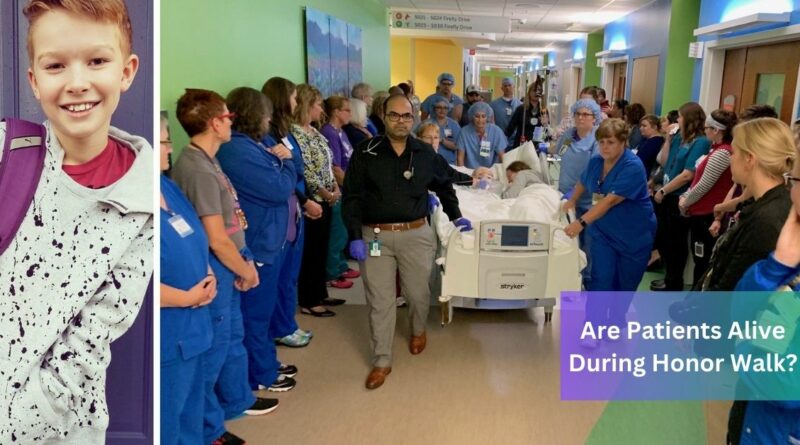Are Patients Alive During Honor Walk? – Unveiling The Honorable Journey!
The concept of an honor walk within the medical realm has become a poignant and compassionate practice. This ceremonial act involves hospital staff paying tribute to organ donors as they are being transferred for organ harvesting.
Yes, patients are alive during honor walks with life support, despite brain death. Are Patients Alive During Honor Walk? It’s a complex scenario, navigating medical interventions and end-of-life transitions.
In this exploration, we delve into the details to provide a clear understanding of this sensitive and honorable process.
Comprehending The Honor Walk – A Profound Symbol Of Respect!
The Honor Walk stands as a poignant and symbolic tribute, primarily crafted to honor the selflessness embodied in organ donation. walk? This solemn ritual is often enacted when a patient, declared brain dead, is maintained on life support to ensure organ viability for donation.
As a reverent procession unfolds, hospital staff unite to form a corridor, paying homage as the patient is gently moved from their room to the operating room for the vital organ recovery process. This deeply respectful ceremony underscores the profound humanity and altruism surrounding the act of organ donation.
The State Of Patients During Honor Walks – Brain Death!

During honor walks, the determination of patients’ status hinges on the declaration of brain death, a precise legal and medical classification. Brain death signifies the complete and irreversible cessation of all brain functions, encompassing the vital brainstem.
Are Patients Alive During Honor Walk? This profound state renders the individual unresponsive, with no signs of consciousness or awareness.
Despite the absence of natural physiological functions, life support remains solely to preserve the body’s physiological integrity, primarily to facilitate organ donation. It is a meticulous balance where medical interventions sustain the body while recognizing the irreversible loss of neurological functions.
Life Support And Organ Viability – A Delicate Balance!
Within Honor Walks, Are Patients Alive During Honor Walk? The patients, sustained by life support, exist in a unique state that challenges conventional notions of life.
While technically classified as alive due to the assistance of life support, it’s crucial to discern this existence from the traditional understanding of life. Life support is a technical mechanism that artificially upholds essential bodily functions like breathing and circulation.
However, the critical distinction lies in the absence of brain function, signifying a state where consciousness and awareness are void in the patient. This delicate balance prompts contemplation on the intricate interplay between medical intervention and the profound concept of life.
Privacy And Dignity – Here to Know!
During the duration of the honour walk, hospitals emphasize preserving the privacy and dignity of the patient and their grieving family. Are Patients Alive During Honor Walk?
This commitment involves the considerate gesture of drawing curtains, ensuring that the deeply personal moment remains shielded from unnecessary exposure.
The entire procession is meticulously conducted with the highest level of respect, acknowledging the emotional weight of the situation.
This ceremonial transfer, carefully navigating the space between the patient’s life and the profound gift of organ donation they are bestowing, serves as a poignant bridge, symbolising the transformative impact of generosity amid the solemnity of the moment. It is a heartfelt acknowledgement of the end of one life and the hopeful beginning for others through the enduring legacy of organ donation.
Legal And Ethical Considerations – Dive Depth!

This expression underscores the significance of delving into the nuanced landscape of legal and ethical considerations within healthcare. Are Patients Alive During Honor Walk?
It motivates individuals to thoroughly examine the intricacies of healthcare ethics, considering the dual influence of the legal structure and ethical standards that mold decision-making in the medical domain.
The wording invites a comprehensive exploration to foster a profound understanding of the moral and legal dimensions that steer healthcare practices. Ultimately, it advocates for a conscientious approach, encouraging individuals to navigate the intricate web of critical considerations inherent in the healthcare profession with diligence and thoughtfulness.
The Impact Of Honor Walks On Healthcare Professionals – Ready To Know!
The engagement of healthcare professionals in honour walks is a profound and emotionally charged experience, rich with deep meaning. Are Patients Alive During Honor Walk? Being part of this ceremonial process gives medical staff a unique opportunity to recognize the immense impact of organ donation.
It serves as a platform for expressing sincere gratitude towards the donor and their grieving family, fostering a connection between healthcare professionals and the selfless act that has the potential to save lives.
This participation transcends the clinical realm, allowing professionals to engage with the human side of their profession and appreciate the transformative power of generosity during times of loss.
FAQS:
1. Why do hospitals conduct Honor Walks?
Honor Walks are conducted to pay tribute to patients, often organ donors, as they transition from their rooms to the operating room. It symbolizes respect for their selfless act and unity among healthcare professionals.
2. Can families participate in Honor Walks?
Yes, families are often invited to join Honor Walks. It provides them with a moment of solidarity and pays homage to their loved one’s altruistic decision, fostering a sense of community and support.
3. How does an Honor Walk impact organ donation?
Honour Walks occur when a patient, declared brain dead, is maintained on life support for organ viability. The ritual underscores the significance of organ donation, honouring the potential to save lives through the patient’s generous decision.
4. Is brain death the same as traditional death?
Brain death signifies irreversible loss of brain function, while traditional death involves cessation of bodily functions. Are Patients Alive During Honor Walk? Honor Walks navigates the intersection between these distinctions and life’s broader understanding.
Conclusion:
Are Patients Alive During Honor Walk? Yes, technically, due to life support, despite being in a state of brain death. This practice underscores the compassionate nature of organ donation, honouring the gift of life amidst transition.
Read:

